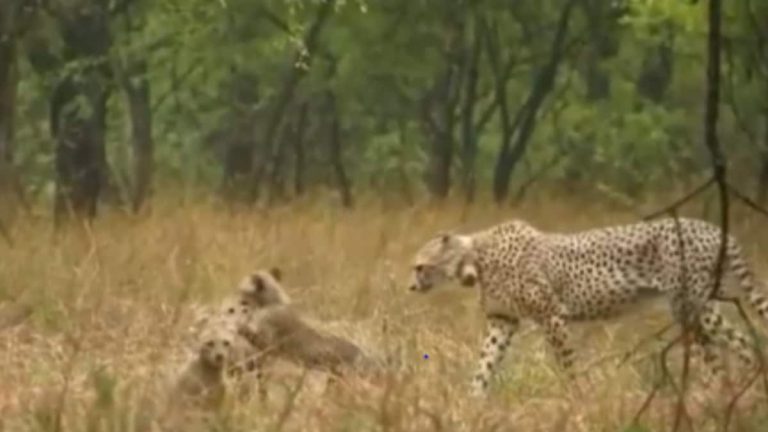African cheetahs brought to India as part of the world's first intercontinental transfer of big cats will soon roam free in the wild again after reportedly being returned to their enclosures at Kuno National Park in Madhya Pradesh for health checks and monitoring nearly a year.
The Centre's Cheetah Program Steering Committee on Friday decided to release African cheetahs and their cubs born in India into the wild in a phased manner after the monsoon recedes from central India, officials told PTI.
According to the India Meteorological Department (IMD), the monsoon usually retreats from most parts of Madhya Pradesh in the first week of October.
“Committee members and NTCA (National Tiger Conservation Authority) officials conducted a field visit to Kuno and discussed the timetable for the release of the cheetahs. After the rains end, the adult cheetahs will be released into the wild in a phased manner, while the cubs and their mothers Will be released after December.
All 25 cheetahs – 13 adults and 12 cubs – are doing well. The animals have been vaccinated against disease and given prophylactic medication to prevent infection, the official said.
The first batch of 8 Namibian cheetahs was introduced to India in September 2022, and the second batch of 12 cheetahs was flown in from South Africa in February last year.
The cheetahs were initially released into the wild, but were brought back into the enclosure last August after the deaths of three cheetahs, one named Tbilisi (from Namibia). The cheetah and two South African cheetahs (Tejas and Sooraj) died due to sepsis.
Sepsis is an infection that occurs when bacteria enter the bloodstream and spread.
The condition is caused by wounds under the cheetahs' thick winter fur on their backs and necks, which become infested with maggots and cause blood infections, according to the government's annual report on the cheetah program.
Officials earlier told the Press Trust of India that some cheetahs unexpectedly grew winter fur during the Indian summer and monsoons in preparation for the onset of the African winter (June-September), the first year the animals in India have been managed. A major challenge.
“Even African experts hadn't thought of this. Winter fur combined with high humidity and heat can cause itching, causing cheetahs to scratch their necks on tree trunks or on the ground. This results in bruises and exposed skin, which attracts egg-laying animals. flies, which led to maggot infestations, bacterial infections, and ultimately the deaths of three cheetahs.
These deaths prompted the steering committee to recommend that “future reintroductions of cheetahs should come from northern hemisphere countries, such as Kenya or Somalia, to avoid circadian complications.”
In December last year, the steering committee drew up plans to release the cheetahs into the wild, but they were not implemented.
Currently, only one cheetah named Pawan is roaming free, and officials note that it is difficult to find and capture.
Despite the challenges and expected mortality rates of such “experimental” programs, experts in both India and Africa have expressed concerns about keeping cheetahs in enclosures for long periods of time.
“Although cheetahs have lived on Indian soil for two years, they are not really living in the wild. Cheetahs like to travel long distances and they can be under tremendous stress,” said an African expert who assisted in the reintroduction of cheetahs in India.
Ravi Chellam, CEO of the Metastring Foundation, said: “Based on global experience and Namibian legal policies, my understanding is that releasing these cheetahs is not a good idea because they have been kept in captivity for such a long time, especially cubs born in captivity.
Another African expert said cheetahs would be well adapted to life in the wild if they had been left to fend for themselves in enclosures and not received supplementary feeding.
“They may also have received anti-parasitic drugs, which can help them during the monsoon, but this may reduce their ability to develop natural immunity to these parasites after release,” experts said.
Seven adult cheetahs (three females and four males) have died since arriving in India, four of them from sepsis. All of these deaths occurred between March 2023 and January 2024.
17 cubs have been born in India, 12 of which survive. This brings the total number of cheetahs in Kuno, including cubs, to 25, with all but one currently in enclosures.
(This report has not been edited by News18 staff and is published from associated news agency – PTI)
